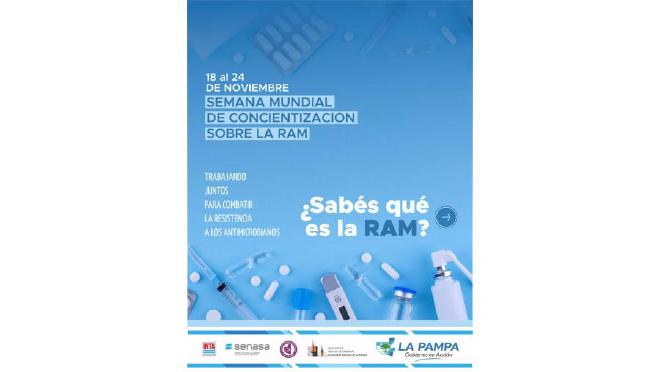

During the World Antimicrobial Awareness Week, the La Pampa’s Zoonosis Board called for the responsible use of antibiotics to treat diseases, in order to maintain their effectiveness.
Antimicrobial resistance (AMR) is the ability of microorganisms – such as bacteria, viruses, fungi and parasites – to evade the action of antibiotics, according to the Provincial Zoonosis Table made up of the Ministries of Production, Health, the Secretariat of Environment and Climate Change, INTA, INTI, the Veterinary Medical College, UNLPam’s Faculty of Agronomy and SENASA.
In Argentina, Law 27,680 on the Prevention and Control of Antimicrobial Resistance regulates the use of antibiotics by establishing the control of the use of these drugs, providing for their sale under prescription and promoting multisectoral actions to confront antimicrobial resistance in human and animal health. In relation to animal health, SENASA in its Resolution 80/2025 and other regulations establishes conditions of traceability, registration, prescription and limits on the use of antimicrobials in production animals (prohibition of use for growth promoters).
In human health, meanwhile, Resolution 3835/69 determines that drugs with antibiotic ingredients must be issued under prescription.
Measures to prevent AMR #
Human Health #
-
Use antibiotics only with medical indication.
-
Avoid self-medication and do not store or share antibiotics.
-
Comply with the complete treatment. Stopping it early encourages resistant bacteria to survive.
-
Strengthen responsible prescribing. Practitioners should prescribe antimicrobials only when they are really needed.
-
Promote vaccination: preventing infections reduces the need to use antibiotics.
-
Promote hygiene and prevention: hand washing, sanitation, safe water and good hospital practices.
Animal Health (Veterinary and Production) #
-
Use antimicrobials only under veterinary supervision. Avoid their preventive use or as growth promoters.
-
Apply good livestock practices: Biosecurity, hygiene, proper management, vaccination and animal welfare.
-
Keep record and monitor medication use.
-
Guarantee safe food: comply with withdrawal times and control of antimicrobial residues in animal products.
Contact [Notaspampeanas](mailto: notaspampeanas@gmail.com)

